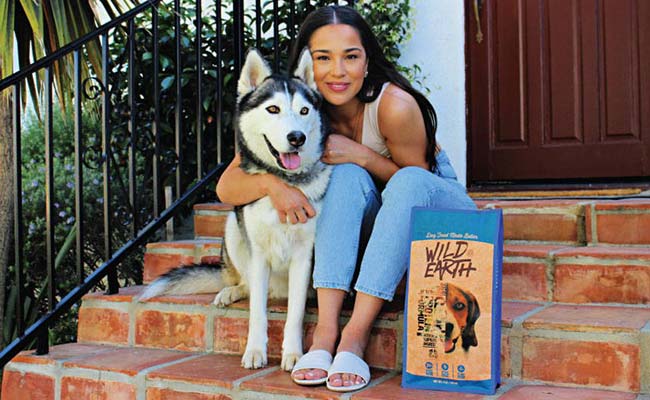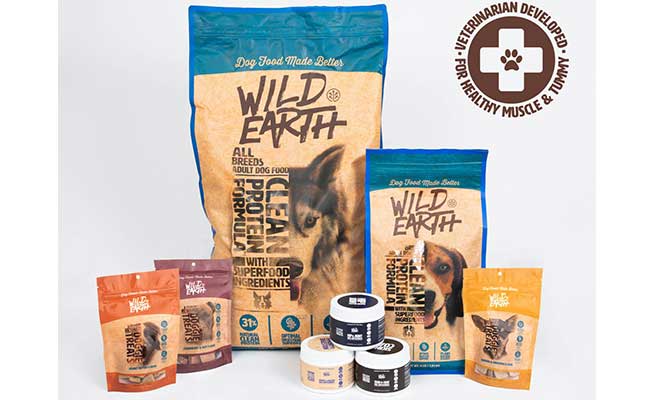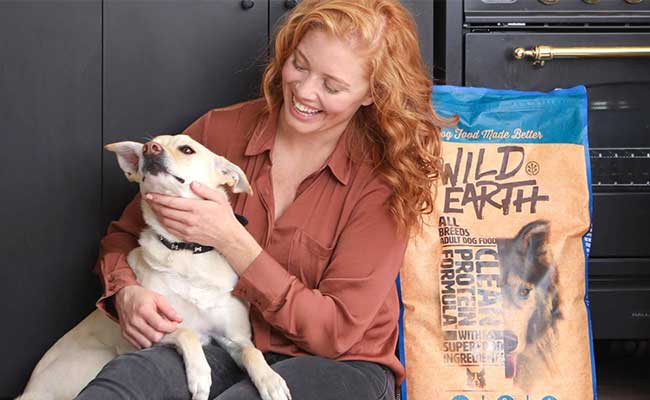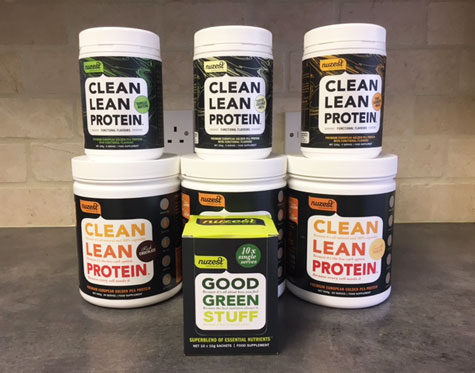Dogs are true omnivores. This means they can get their nutrients by eating animals or plants. So it actually doesn't matter where a dog gets its protein from, as long as its nutritional needs are met and all amino acids are provided in the dog's diet.
Like you, I'm a dog lover. Growing up my family had two West Highland White Terriers, then a Shih Tzu, and now we have Parsons Jack Russell cross Shih Tzu.
Just like a child, your dog is an important member of the family and naturally you want the best for him/her. I'm sure you're also conscious that it is ethically questionable to keep your dog alive by feeding it other animals.
However, in the past there have been question marks over whether plant-based dog food options are able to provide full-spectrum nutrition, so owners are rightly apprehensive.
There are a number of vegan dog food companies that claim to improve a dog’s well-being with wholesome ingredients, in particular helping to solve digestive and allergy issues associated with commercial dog food.
Wild Earth is one such brand that has become very popular, and is the one my family is using. In this review I'll break down what Wild Earth is, what the ingredients are, what the science says about it, and whether it's right for your canine family member.
Contents:
- About Wild Earth
- Ingredients
- Products
- Customer Research
- Pricing
- Ordering (quantity per dog)
- Refund Policy
- Vegan Dog Food Research
- Summary

About Wild Earth
Wild Earth came about as a response to the state of the dog food industry and its reliance on meat-based foods.
Having researched the unhealthy additives and ingredients used in commercial dog food, the founders embarked on a mission to produce a high quality, plant-based food instead.
But why plant-based?
In one word: sustainability. It's kinder to the planet, and doesn't involve killing other animals.
We all know that humans must cut their meat consumption to reduce emissions and the negative impact animal agriculture has on the planet. Dogs are not exempt from this. The number of dogs is increasing, and according to a UCLA study:
There are more than 163 million dogs and cats in the US, and they constitute about 25–30% of the environmental impacts from animal production in terms of the use of land, water, fossil fuel, phosphate, and biocides. Dog and cat animal product consumption is responsible for the release of up to 64 million tons of CO2-equivalent methane and nitrous oxide, two powerful greenhouse gasses (GHGs)
The Wild Earth team pitched their vision on Shark Tank, an entrepreneurs TV show, and landed a $550,000 investment for a 10% stake in the company.
With that investment, they put together a team of veterinarians and nutritionists to create Wild Earth, a cruelty-free, sustainable vegan dog food that improves health and reduces digestive problems and allergy issues.
Wild Earth Ingredients
No one wants to feed their dog corn syrup, MSG, chemical preservatives, and artificial colorings. But that's sadly what you'll find in many commercial dog foods.
Wild Earth, on the other hand, uses 100% natural, healthy products, all FDA and AAFCO approved (Association of American Feed Control Officials).
Wild Earth dog food contains 31% protein. The secret to this high yield is down to pea protein and yeast; but yeast in particular, as it contains all 10 essential amino acids. Several sources of fiber are provided too, which is hugely important for digestion.
Yeast are miniature protein factories. They pump out ultra high-quality protein, grow easily at scale, contain all 10 essential amino acids, and require radically fewer resources to produce. Can't argue with that!

Here's the full list of Wild Earth ingredients:
- Blueberries
- Calcium carbonate
- Calcium iodate
- Canola oil
- Chickpeas
- Choline chloride
- Copper proteinate
- Cranberries
- D-calcium pantothenate
- Dicalcium phosphate
- Dried aspergillus oryzae fermentation product
- Dried yeast
- Flaxseed meal
- Folic acid
- Fructooligosaccharide
- Inulin
- Iron proteinate
- L-carnitine
- Manganese proteinate
- Marin microalgae
- Niacin supplement
- Oats
- Pea protein
- Pumpkin
- Pyridoxine hydrochloride
- Riboflavin supplement
- Rosemary extract
- Salt
- Sodium selenite
- Spinach
- Sunflower oil
- Sweet potato
- Taurine
- Thiamine mononitrate
- Vitamin A supplement
- Vitamin B12 supplement
- Vitamin D2 supplement
- Vitamin E supplement
- Wheat germ
- Zinc proteinate
+ Get 50% off your first order!
The Products
Wild Earth dog food is loaded with all 10 essential amino acids while using 90% fewer resources than meat-based dog food.
One of my favorite things about Wild Earth is that it's one size fits all. It's one food for all dogs, but sold in two different sizes: 4-pound and 18-pound. There's no having to choose between different foods for different types, ages, or allergies/sensitivities.
They offer treats too, but just three kinds: peanut butter, banana and cinnamon, and strawberry and beet – all vegan, of course.
The treats contain a special ingredient named “koji”. This is an ancient mushroom packed with protein and anti-cancer properties.
Customer Research (Survey)
It's one thing to claim your product is “amazing”, but some further verification from satisfied customers is expected – and even then testimonials can be misleading.
Wild Earth has gone that step further and conducted a study among its customers, asking for information on taste, energy, joint health, digestion, stool quality.
425 dog parents completed the detailed survey, and the results were very positive:
77% of those surveyed had been feeding a meat-based dog food prior to the switch, and 86% of them reported a positive health benefit for their dog after switching to Wild Earth.
Here are the results of specific health outcomes:
- Over 50% saw an improvement in their dog’s skin and coat.
- 43% saw a reduction in itching and scratching.
- 54% saw an improvement in their dog’s poop.
- 41% saw a reduction in their dog’s gas.
- 26% saw an improvement in joint health.
- 44% saw an improvement in energy levels.
- 41% saw an improvement in appetite.
- 40% saw an improvement in breath and odor.
Of course this is self-reported data, but I think we can safely say that any dog owner who wasn't happy with the food wouldn't just say they were for the sake of a survey.
I can verify in my own dog that breath smell improved and joint health has remained very good for an older dog (11 years). Other than that, there has been no digestive issues or changes in poop. It was great to have such a seamless transition, as the one thing we all fear is gas and diarrhea.
I encourage you to watch some of the videos on the Wild Earth homepage. There's some interesting transition stories on there from owners and their dogs.

Wild Earth Pricing
Wild Earth is more expensive than your cheap canned food, but as a dog lover I'm sure you'll agree that paying extra to improve your dog's health is worthwhile.
Meat-based dog food is generally cheap to produce, but natural, organic foods made at lower production scale are of course going to cost more.
A 4-pound bag of Wild Earth costs $29, and an 18-pound bag costs $70.
The good news is that you can save 20% on your first order if you subscribe for a repeat delivery, and then 10% on subsequent orders.
You can arrange to have your dog's food delivered every 2-8 weeks, depending on your requirements, with free shipping.
The dog treats cost $10 for five ounces, which is fairly reasonable given the quality. We have not tried these, but again, like the vegan kibble food, there are no additives, preservatives, or fillers in these treats.
+ Get 50% off your first order!
How Much Does My Dog Need?
There's a handy calculator on the order page to work out how much food your dog will need. It goes by weight.
My dog falls into the second category and uses 1 small bag every 4 weeks.
If you have more than one dog, there's also a calculator that helps you work out the quantity you'll need.
30-Day Challenge
Like many dog owners, you may be apprehensive about making such a big change to your dog's diet. I completely empathize with this and encourage you to take the 30-day challenge first. Doing so will also save you 50% on your first order, and 10% thereafter.
The 30-day challenge provides:
- One bag of Wild Earth dog food
- A free surprise gift (with your second delivery)
If after 30 days you're not happy, just switch back to your old food.
Refund Policy
Wild Earth has a generous refund policy. If your dog doesn't like the food you can simply request a refund; no need to send the bag of food back. This makes your first purchase zero risk.
Studies On Plant-Based Dog Food
A meta analysis of four key studies that looked at the safety of vegetarian diets for cats and dogs concluded the following:
There is—at least in theory—no reason why diets comprised entirely of plants, minerals, and synthetically-based ingredients (i.e., vegan diets) cannot meet the necessary palatability, bioavailability, and nutritional requirements of cats and dogs. Indeed, a growing number of commercially available diets aim to do so (1).
Both cats and dogs may thrive on vegetarian diets, but these must be nutritionally complete and reasonably balanced.
From an evolutionary standpoint, dogs are better suited to a vegetarian/vegan diet than cats. This is because cats are obligate carnivores, not omnivores, and generally lack the genetic, biochemical and behavioral adaptations that enable dogs to thrive on an omnivorous diet.
That being said, the study states that, although interesting…
It is important to acknowledge the limited relevance of such evolutionary adaptations to the modern, domesticated lifestyles of cats and dogs who are fed commercial diets from cans or packets at predictable times daily. What's important is that a diet is sufficiently “palatable, bioavailable, nutritionally complete, and reasonably balanced. Each species and life stage (e.g., juvenile, adult, pregnant, lactating, geriatric) requires a particular nutrient profile; the provision of which can prevent malnutrition and can assist in the management of other diseases.
A Study On Vegan Dogs
In 1994, People for the Ethical Treatment of Animals (PETA) released the results of a study of 300 vegetarian and vegan dogs sourced from 33 states within the U.S. and Canada.
Dogs ranged in age from young puppies to 19 years old, and included a wide range of breeds, males and females, both neutered and entire. Of these, 65.3% (196/300) were vegan, with the remaining 34.7% (104/300) simply vegetarian. Over 80% of dogs maintained on vegan or vegetarian diets for 50% to 100% of their lifetimes were reported as being in good to excellent health.
The average age of death of the dogs surveyed was 12.6 years.
Nutritional science has come a long way since this 25 year old study, as has dog food production. If the dogs in that survey lived out healthy lives comparable to that of meat-eating dogs back then, the results are likely to be better now.
That being said, your dog's health is down to more than just the brand of dog food you use. Lack of exercise and excess feeding will lead to obesity and poor organ health.
In a nutshell: as long as the nutritional needs of your dog are being met, and he/she is receiving an adequate level of daily exercise and having regular veterinary checkups, he/she will thrive.
In Summary
The problem with meat-based dog food is three-fold.
The first problem is that it lacks fiber, which encourages digestive problems. Like humans, dogs need fiber; it's essential in preventing disease, too.
And then there are allergies. The primary cause of dog food allergies is meat. A plant-based dog food diet can help alleviate all the common problems such as itching and scratching, constant paw licking, red belly, eye discharge, chronic diarrhea, and more.
Thirdly, the over-reliance of meat in dog food is responsible for 25-30% of the environmental impact of meat consumption in the United States. It's just not sustainable.
Wild Earth addresses these issues and, while you might pay a little more for the food, you're likely to pay less in vet bills due to better health.
While some people may think that dogs need meat; scientifically speaking, they don't. Although a dog’s ancestor is a meat-eating wolf, his digestive system has changed over the past 10,000-36,000 years, due to adaption to domestication by humans.
Dogs just need the right amount and balance of nutrients. The source for these nutrients can be from plants or meat.
Wild Earth dog food works for my dog and I'm sure it can for yours.
It really is a blessing to not have to feed your dog other animals, and to know that you are nourishing his/her health in the process. To realize that humans and dogs can live as companions, without having to hurt other animals, is a truly beautiful thing.
* Please note: if your dog has a specific medical condition or dietary requirement, you should speak with your vet before changing to a plant-based (vegan) kibble.




Leave a Reply